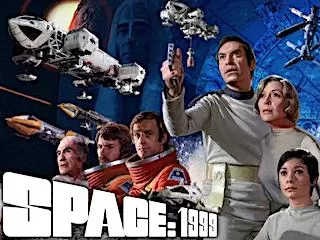
A few years ago, fans of Space: 1999 were given some hope that the show was getting revitalized when a sizzle reel appeared describing “Space: 2099”, a reintroduction of the series. Now, this was nothing like the Ron Moore reboot of Battlestar Galactica. Rather, it was more like George Lucas’ enhancement of the original Star Wars trilogy: updated effects and a few editorial changes.
Space 2099 was intended to be a re-editing of the original series, with changes made to modernize it. There were no new episodes or new characters, but rather a reworking of the classic series that would hopefully be more appealing to modern viewers.
Although Space 2099 was merely a polishing of the existing material rather than a continuation or a “reimagining” of the show, it is still informative to take a look at this effort because the team behind it very clearly laid out the changes they planned to make. These changes includes:
- Updated special effects, which obviously have advanced a great detail in the five decades since the series was produced.
- Re-ordering episodes to emphasize certain through-stories, and the introduction of “previously on” segments to call attention to people and themes that were referenced in the past. While it’s true that the series was not necessarily aired in the order the creators originally intended (as some episodes required much more post-production than others), there isn’t an established logical order for the episodes, either. While some character development and relationships can be said to change over time, I’m not sure how much intentional change we really see over the course of the series, but maybe there is more than met my eye.
- The introduction of a wormhole that the moon would enter during its initial breakaway from Earth’s orbit, intended to help explain how the moon made it out to deep space in the first place. This is an attempt to address one of the most persistent criticism of the show — that the moon makes for an unlikely spaceship. (Believe it or not, having the moon blast out of Earth orbit was not part of the original plan for the series. I’ll explore this aspect of the show in a future post.)
- Tighter editing of the episodes for pacing purposes. While Space: 1999 was a bit slow by American standards in the 1970s, just about every show and movie from that era seems very slow paced when compared to their modern counterparts.
- Edits in dialog to alter time references, to set the revised series in the year 2099 instead of 1999. For example, instead of saying “back in 1987”, the video is edited so that the speaker seems to say “back in ‘87”. In this writer’s opinion, this seemed superfluous, but it was nevertheless a point of emphasis for the 2099 team.
Ironically, it seems that the Space 2099 project died because it competed with a full-on reboot of the franchise (which, clearly hasn’t happened yet.) It’s a shame that this work was never completed, because it had the chance of inexpensively revitalizing interest in the franchise and probably increasing the chance for a sequel or reboot to happen in the future.
After digging for some time, I uncovered this message from Eric Bernard, who was spearheading the project. This message was posted on or before February, 2009 on the now-defunct project website, space2099.tv.
Dear Space: 2099 supporters, I am sad to announce that as of November 3rd, 2008 all of our Space: 2099 videos will no longer be available with the exception of the Space News. As many of you know, this website was produced to be shown to Granada/ITV as part of a proposal for an enhanced version of Space: 1999 to reignite the franchise. We got their attention all right, but unfortunately they’ve let us know that they’re currently not interested in our concept and asked us to remove all the videos with Space: 1999 footage so that there would be no conflict with their distributors.
I want to thank all of you for your great support!
… I believe that Space: 1999 would have benefited from this concept as it would have been a perfect platform for a new series. I still have all kinds of ideas that haven’t been shown here that could have created an unprecedented event in sci-fi television. I have been told that Granada is looking at some Space: 1999 proposals at the moment for a FULL REMAKE of the series. However, since 2002 I’ve been in contact with the owners of Space: 1999 and each time I got the same reply as this one. As you all know, no remakes have been done to date.
Assuming that Space: 1999 someday does get the full reboot/reimagining treatment, what are the most important elements of the original show to keep?
Stay tuned…


